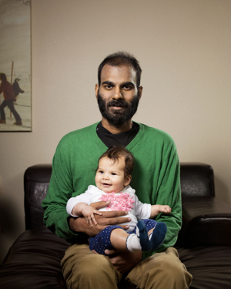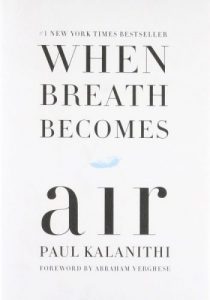Photo by Martha Dominguez de Gouveia
Kalanithi’s memoir When Breath Becomes Air, published posthumously in 2016, offers a compelling and eloquent portrait of a moral agent who chose to live his life based on his values from beginning to end.1
A moral agent is a person who acts with reference to their values.
Kalanithi’s agency is predominantly expressed through his ability to refine a new identity under the constraint of terminal illness. Kalanithi’s model of moral agency is presented to nuance homogenous depictions of moral agency under terminal illness and his story reveals three important insights: (1) identity loss can be the primary constraint experienced during illness, (2) self-reflection and writing are moral acts, (3) moral agency is never accomplished in an autonomous vacuum but requires the help of others. Medical providers and others caring for those at the end of life can utilize these insights to provide higher quality care for those with terminal illness.
Paul Kalanithi as Moral Agent
Paul Kalanithi was a striver. He had degrees in multiple fields from top universities, pursued a career in neurosurgery, the most rigorous specialty in medicine, worked exceedingly long hours pursuing his goal of excellence in medical care, and was never satiated with pat answers to existential questions—he searched for and created his own meaning in life.
Kalanithi’s profession became the locus in which he practiced moral agency. On deciding to become a neurosurgeon, the young doctor writes that he was “compelled by neurosurgery, with its unforgiving call to perfection” because it connected with him on a moral level.2 The drive for perfection in medicine was a way to achieve “the ancient Greek concept arête.” It was through his work as a physician that Kalanithi drove himself to achieve the “moral, emotional, mental, and physical excellence” required in the moral life.3 Reading his memoir confirms that this man attempted to lead a life of moral excellence. Kalanithi’s descriptions of his interactions with patients reveal his attempt to approach each person with utmost compassion and attention. He took great care in his work and critically recognized when he had slipped into formalism or a professional automation devoid of empathy and deep listening.4 Kalanithi’s identity as a moral agent was deeply tied to medicine and his ability to heal others.

Terminal Illness and the Constraint of Identity Loss
His diagnosis with metastatic lung cancer at thirty-six shook the foundations of his self-identity. Kalanithi experiences intense physical suffering and emotional stress throughout his illness, but he experiences the constraint of illness most deeply as a loss of identity. The fact that terminal illness causes a disintegration of self-identity and that this can be an individual’s primary form of suffering has been understudied in medicine, sociology, and psychology.
Excerpts from Kalanithi’s memoir reveal that different types of suffering can be fundamentally connected to a sense that an individual’s identity is being stripped away. The physical effects of illness impact Kalanithi’s sense of himself as a robust and productive agent. Before he begins chemotherapy treatment, the young neurosurgeon experiences extreme levels of pain that are occasionally so debilitating he drops to the floor and curls up in a fetal position.5 Kalanithi describes this intense pain, but the physical symptoms alone are not his principal concern. Instead, his frequent remarks reveal that Kalanithi feels constrained not by the embodied feeling of suffering, but by what the physical symptoms take away from him. It is only when he can no longer do the things he once did like stand for hours in surgery, go on long bike rides, or run a half marathon that he begins to feel constrained by his illness.6 Describing his new difficulty getting in and out of bed, he writes that his “body, and the identity tied to it, had radically changed.” Bodily changes had a direct effect on Kalanithi’s identity. The young, fit and relentless surgeon who worked more than one hundred hours a week struggled to comprehend his place in the world once his body was stunted by illness.
In addition to feeling that his bodily identity had been lost, Kalanithi also experiences the loss of his future as a rupture to his sense of self. After his terminal diagnosis, Kalanithi remarks that the life he had been preparing for was suddenly a mirage—his once bright future had become opaque. At an event with his medical school friends, Kalanithi recognizes his peers are “living the future that was no longer mine: early career awards, promotions, new houses.7 The realization leaves Kalanithi with a “paralytic uncertainty” and he questions how to continue living—should he return to surgery, write, spend time with family and friends?8 For Kalanithi, recognizing his mortality does not so much provoke fear as it stimulates anxiety and an unease with himself. With his desired future no longer possible, he would have to find a new way to forge ahead.
“A Strange Relativity: Altered Time for Surgeon-Turned-Patient”9
It was the loss of his profession that impacted Kalanithi’s self-identity most strongly. Looking at his CT scans with his wife revealed a body covered in cancerous cells, Kalanithi remarks “that [his] identity as a physician—[his] identity—no longer mattered.” Those few words, replete with deep sadness, loss, and confusion, reveal how deeply Kalanithi’s identity was tied to his ability to be a physician. It was through medicine that he found meaning in his life and was able to act as a moral agent. Being a neurosurgeon “was a sacred thing” and a “moral duty,” yet his illness canceled his ability to perform the moral and sacred acts of healing.
Without his responsibilities in the hospital, Kalanithi quickly came to see himself as an “invalid.”10 This new conception of himself is so contrary to his prior way of life where he relished making difficult decisions in surgery and was ever striving towards professional perfection. The dissonance Kalanithi feels without his work is emphasized when Kalanithi writes,
“because I wasn’t working, I didn’t feel like myself…as a doctor, I wasn’t an agent, a cause; as a patient, I was merely something to which things happened.”
Stripped of his profession, Kalanithi no longer views himself as an agent, instead he is a patient—someone who passively accepts the actions of others. The switch in roles, from doctor to patient, subject to object, described in the memoir reveal how thoroughly constrained Kalanithi is by his loss of identity. Once his ability to practice medicine is gone, Kalanithi is left feeling ineffective and powerless.
Identity Formation as Moral Agency
It is within this space of identity loss that Kalanithi acts as a moral agent by reclaiming his identity.
A moral agent is a person who attempts to live out their values, but under the constraint of terminal illness, a person’s priority may be to reclaim their identity as a moral agent and identify their values once again.
For those dealing with terminal illness, tangible actions may no longer be possible, and it is precisely in shaping or recrafting an identity that moral agency is practiced.
Kalanithi recognizes that his self-identity has been torn apart because of his cancer diagnosis, but he does not rest in this realization. Instead, he begins a process of intentional introspection to determine how his agency will manifest in his current circumstances. Kalanithi repeatedly articulates the necessity to “clarify the rest” of his life and “find his values” in the midst of suffering.11 His self-awareness is apparent in these quotes and it is this quality that aids Kalanithi as he attempts to craft a new identity. The young doctor never shies away from difficult questions or sugarcoats his reality; instead, he acknowledges the devastating appearance of cancer in his life and it is this ability that allows him the freedom to create a new sense of himself.
In the final months of his illness, Kalanithi officially ends his career, but it is at that moment that he brings his focus to the task of redefining himself yet again, spending his remaining time as a father, husband, and writer. As his illness becomes more debilitating, Kalanithi remarks that he “needed words to go forward.”12 Writing becomes a process of metamorphosis whereby the raw experiences of illness are transmuted into a meaningful cohesion. Creativity provided a tool for Kalanithi to rebuild his identity in this stage of his life.

While the process of writing allowed Kalanithi to regain a sense of self, the memoir was not solely intended to be a private act. In a letter to a friend, Kalanithi states that he hopes the book will allow the reader to walk in his shoes while simultaneously realizing that one day they will be in the same place, walking the path of dying, but this time in their own shoes.13 Although Kalanithi was no longer able to perform surgery, the value he placed on healing and compassionate care never left him. Kalanithi was able to preserve his fundamental values and his identity as a healer through writing. The book itself is a healing act and a physical manifestation of the values Kalanithi sought to live out in his life as a moral agent.
Kalanithi’s Model of Agency:
Insights for Medicine and End-of-Life Care
Kalanithi’s experience demonstrates that a moral agent does not have to be a fully autonomous person in control of their every action. His ability to exert moral agency was tied to a community of people. It was through the help of his family and oncologists that Kalanithi was able to repeatedly confront loss and not become despondent or bereft of hope. His doctor had an especially important role to play in his development of moral identity. Kalanithi writes that he “had gone from being unable to believe I could be a surgeon to being one…She [his doctor, Emma] had always kept this part of my identity in mind, even when I couldn’t.”14
Throughout his illness Kalanithi’s primary doctor repeatedly asks him to define his values and identify how he wants to continue to life; she never allows him to slip into a complacent or apathetic attitude. Kalanithi is supported and nurtured with his doctor’s guidance to continue searching for meaning and self-expression in a terrifying terrain he had never traversed. If his doctor had simply listened to his complaints and prescribed him the necessary treatment, Kalanithi would have been left without the emotional and psychological accompaniment he truly needed. Kalanithi’s experiences with illness lead him to the conclusion that “the physician’s duty is not to stave off death…but to take into our arms a patient and family members whose lives have disintegrated and work until they can stand back up, and make sense of, their own existence.”15 Medicine is a difficult calling and Kalanithi makes it clear in this quote that the work of healing is not simply about curing symptoms—a deeper level of healing is necessary. The physician must become a guide helping the patient along the process of creating a new identity in the face of suffering.
It may seem extremely idealistic to ask busy physicians to take on the role of guide but little changes in doctoring could achieve this end. Grand schemes would not be required for patients to feel that they were being supported and families can play a role in facilitating this process. Kalanithi’s physician was able to guide him through his illness by her compassionate presence and constant questioning. The doctor who is able to genuinely listen to patients has already begun to aid the patient through the process of deeper healing. Caregivers can also facilitate the restoration of self-identity after the diagnosis of terminal illness by offering spaces were the ill person can honestly share their life story and determine how to continue living. Families and medical institutions could provide patients opportunities for creative pursuits, which would allow for self-reflection and the redevelopment of moral agency.
When Breath Becomes Air was Kalanithi’s parting gift to the world. His wife Lucy comments in the epilogue that he “was singularly focused on finishing” the book in the last months of his life.16 Filled with raw honesty and wisdom, Kalanithi’s memoir offers a vision of moral agency that is not commonly depicted or explored. Although the story of the dying hero who struggles against illness is a repeated subject of literature and film, Kalanithi’s agency is subtly distinct from this common narrative. He does pursue treatment in the hope of adding years to his life, yet “fighting” a disease and being a courageous patient are not where his moral agency lies. Kalanithi’s struggle to reclaim a moral identity, in the face of a disorienting experience that leaves the doctor a patient, offers a unique perspective when compared to more popularized illness narratives. Kalanithi’s example of agency is helpful on a theoretical level because it nuances the traditional notion of a moral agent, yet his work’s greater value manifests in the text’s ability to speak directly to an individual offering them hope that even in the midst of terminal illness moral agency is possible.
Want to know more about this author? Click here!
Footnotes
- Paul Kalanithi, When Breath Becomes Air (New York: Random House, 2016).
- Ibid.,72.
- Ibid.
- Ibid., 85.
- Ibid., 11.
- Ibid., 79 and 140.
- Ibid.
- Ibid.
- Stanford Medicine, “A Strange Relativity: Altered Time for Surgeon-Turned-Patient,” February 19, 2015, Video, https://www.youtube.com/watch?v=d5u753wQeyM.
- Kalanithi, 125
- Ibid.
- Ibid., 136
- Ibid., 149
- Ibid., 215.
- Ibid., 163-4
- Ibid., 206.
